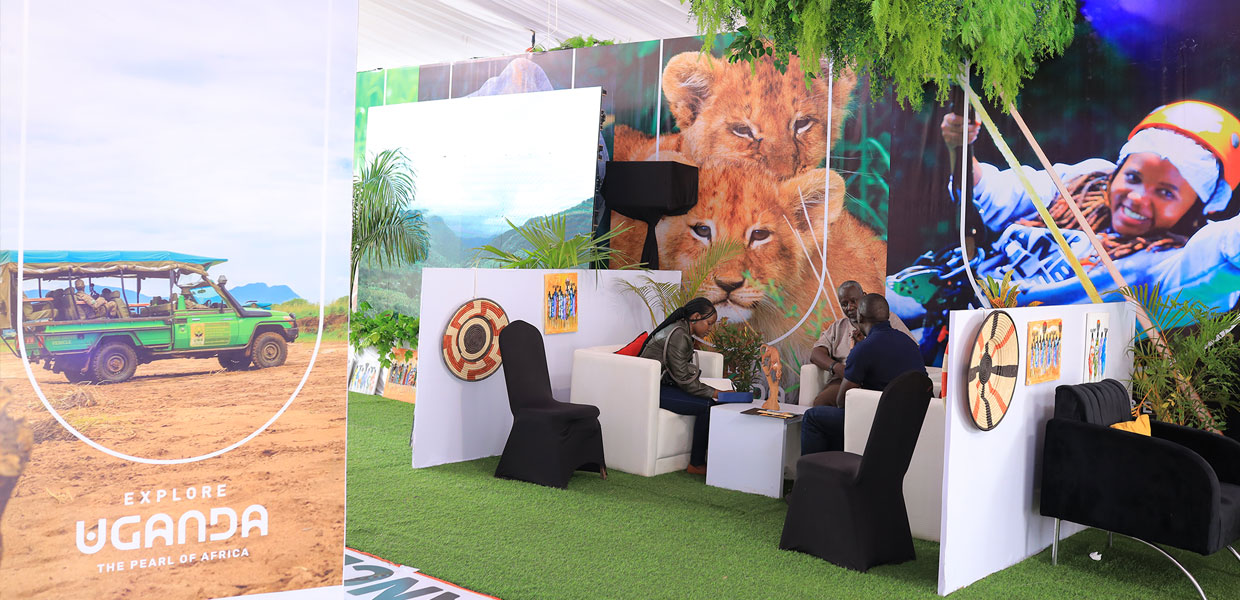
Tourism Information Management System (TIMS):
The project is supporting the development of a web-based Tourism Information System where information can be stored, saved, displayed, easily retrieved, and readily accessible to support decision-making and business continuity.
TIMS users will be able to collect and input information that is relevant to them. It will also allow Uganda’s tourism sector to monitor arrivals from immigration e/cards. It will provide a decision-support system for sustainable tourism including the collection of tourism arrivals statistics, market intelligence, supply statistics and other important areas of tourism management information. The availability of this information will improve planning and investment decision making by the public sector and provide reliable market intelligence to guide marketing spend and further investments.
Meetings, Incentives, Conventions, and Events (MICE) Bureau:
The project has supported market research and the rollout of Uganda’s new destination brand, Explore Uganda The Pearl of Africa, in partnership with professional destination management representatives in source markets. With CEDP support, UTB has connected leisure and business tourism through the production of a vast array of high-quality tourism marketing and promotional materials. This has influenced and promoted Uganda as a preferred tourist destination and created top of mind awareness.
CEDP has also supported Uganda to participate in MICE expos, hosting of international conferences and meetings and membership of key MICE associations. UTB has participated in a number of Trade shows and sponsored private sector participation in the iinternational business tourism events like IBTM-World 2023 in Barcelona, and IMEX Frankfurt 2023 which are the largest trade shows in Europe for the meetings and events industry and brings together global event planners and buyers. UTB also participated in Meetings Africa 2th Feb to 1st March 2023. These have provided public and private sector players enormous opportunity to diversify Uganda’s tourism offerings. Uganda is now in a better position to effectively promote and market Uganda as a MICE tourism destination. The sector has been able to establish and maintain presence in key MICE tourism regional and international tourism source markets and disseminated a broad range of MICE tourism marketing collateral.
Particularly noteworthy is CEDP’s facilitation of this year’s Pearl of Africa Tourism Expo (POATE) which was aimed at promoting Uganda’s tourism by bringing together regional and international tour operators, travel agents, destination agencies and various players in the tourism business.
Destination planning and identification of investment opportunities:
The project is supporting the consultancy for the development of the Integrated Destination Development Plans for the Albertine Graben which will identify a short list of transformative anchor projects with the potential to crowd in private investment, and for which the necessary feasibility studies (that factor in potential climate change impact) to assess for potential private investment, will also be undertaken.
Corporate governance training:
The improvements in management performance sought to make the institutions more efficient and provide timely services to the private sector at affordable costs, thus contribute to increasing private sector investment. Corporate governance training being one way of improving management performance towards the attainment of the sector objectives, it was supported by the project to build an environment of trust, transparency and accountability that is necessary for the provision of timely services at affordable costs and increase private sector investment.
Human Capital development:
In order to enhance the capacity of both Uganda Hotel Tourism and Training Institute (UHTTI) and Uganda Wildlife Research and Training Institute (UWRTI), the project has supported a mutually-beneficial educational and pedagogical relationship between with internationally recognised training institutions. It has also supported the review of the Curriculum of UWRTI in accordance with the National Council for Higher Education (NCHE) -Curriculum Development Review Guidelines and Regulations. Both UHTTI and UWRTI programmes on skills are expected to become more relevant through producing students who respond to the needs of employers and therefore their improved employability.
Uganda Wildlife Education Centre (UWEC):
CEDP is supporting the strengthening of the capacity of Tourism SMEs along the Lake Victoria Circuit to engage in tourist-related commercial activities, to enhance their sustainability and that of the fragile Lake Victoria Ecosystem, in delivering an overall tourism experience to tourists who visit UWEC. The project has also procured essential vehicles and equipment such as a fibre glass boat, rig van, tractor, golf carts and others that have enhanced the agency’s ability to fulfill its mandate to conserve the country’s native wildlife alongside education and awareness.
Uganda Museum:
The project has supported an Options study for a results-based management, and the development of the Uganda Museums and Monuments Strategic Plan for the Period 2022– 2026, consistent and aligned to Uganda’s Comprehensive national policy and planning framework, and in line with regional and international development planning frameworks.
Infrastructure developments:
Various contracts have now been signed for the infrastructure developments at the Uganda Wildlife Education Centre in Entebbe, Hotel School in Jinja (UHTTI), the Wildlife Training School in Kasese (UWRTI), and the Uganda Museum in Kampala.
In preparation for all infrastructure developments, the project has, as a prerequisite, supported the assessment of climate vulnerabilities of sites and specific measures for adaptation and mitigation. These will guide the contractors who will have been engaged for specific infrastructure expansions and developments, to ensure implementation of the specific climate resilience measures as part of their contracts.
The upgrading of the existing facilities at Kampala, Entebbe, Jinja and Kasese will enable the beneficiary institutions carry out their basic functions, but also be able to attract private sector to develop more products and services around them. For UWEC, the developments will contribute to the tourist circuit on Lake Victoria, the Botanical Gardens, Lutembe Beach, and Ngamba Island in Lake Victoria and other trails on the circuit. CEDP proposes to take infrastructure improvements, to closure using a PPP framework and other financing models in order to contribute to greater sustainability, improved and more professional management, and provide an overall improved tourism experience. For UHTTI, the infrastructure is expected to contribute to attracting management entities to compete for the operation of both the hotel and the training facility.